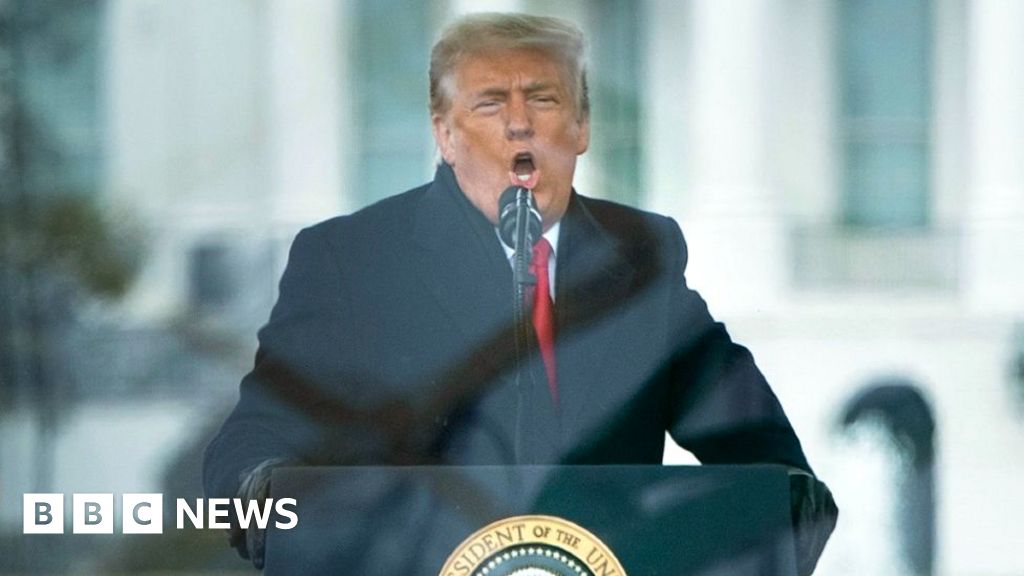has questions to answer over edited Trump speech, MPs say

BBC Faces Scrutiny Over Edited Trump Speech in Panorama Documentary
The BBC is facing intense scrutiny after a cross-party group of MPs raised "serious questions" regarding a Panorama documentary that allegedly misled viewers by editing a speech delivered by former US President Donald Trump. The controversy stems from accusations that the program, titled "Trump: A Second Chance?", deceptively presented Trump's words to suggest he explicitly encouraged the Capitol Hill riots on January 6, 2021.
Allegations of Misleading Editing
According to a report in The Telegraph, an internal BBC memo revealed that the documentary spliced together two separate parts of Trump's speech. The edited version created the impression that Trump directly urged his supporters to march on the Capitol and "fight like hell," when in reality, these statements were made at different times and in different contexts. The "fight like hell" comment was part of a broader discussion about alleged election corruption.
The House of Commons culture, media and sport committee has formally written to BBC chairman Samir Shah demanding an explanation and outlining the steps being taken to address the concerns. Caroline Dinenage, head of the committee, emphasized the need for reassurance that the BBC is treating the matter with the utmost seriousness and taking decisive action to safeguard its reputation for integrity and public trust. "The corporation must set the benchmark for accurate and fair reporting, especially in a media landscape where it is all too easy to find news presented in a less than impartial way," she stated.
BBC's Response and Government Involvement
A BBC spokesperson issued a statement acknowledging that the corporation takes feedback seriously and considers it carefully, although they refrained from commenting on leaked documents. Downing Street confirmed that the Culture Secretary, Lisa Nandy, and senior officials at the Department for Culture, Media and Sport are aware of the memo and have received assurances from the BBC that the issues are being investigated.
The prime minister's spokesman reiterated the government's stance, stating: "We take any criticisms of the BBC's editorial standards very seriously and we expect the BBC to consider any feedback that they receive seriously and carefully."
Political Fallout and Calls for Accountability
The allegations have triggered a significant political backlash. Conservative leader Kemi Badenoch, speaking to GB News, described the edits as "absolutely shocking" and "fake news," calling for the dismissal of those responsible. Former Prime Minister Boris Johnson also weighed in, questioning whether anyone at the BBC would take responsibility and resign.
The report obtained by The Telegraph was reportedly authored by Michael Prescott, a former independent external advisor to the BBC's editorial guidelines and standards committee. He left his role in June, and the whistleblower sent the report to every member of the BBC board last month.
Expert Analysis: The Implications for Public Trust
Dr. Sarah Miller, a media ethics professor at the University of Oxford, commented on the potential damage to the BBC's reputation. "The BBC's credibility hinges on its perceived impartiality. Any suggestion of deliberate manipulation, even if unintentional, erodes public trust. This incident underscores the critical importance of rigorous editorial oversight and transparency in news reporting, especially in an era of heightened political polarization."
“The digital age has made it easier than ever to manipulate audio and video,” adds David Miller, director of the Centre for Media Monitoring. “The BBC needs to ensure its journalists are not only highly skilled but also acutely aware of the potential for manipulation, and that editorial checks are in place.”
BBC Arabic Under Scrutiny
In a separate but related development, The Telegraph also reported that Mr. Prescott raised concerns about alleged bias in BBC Arabic's coverage of the Israel-Gaza war. The report claimed that BBC Arabic featured pro-Hamas and antisemitic commentators on numerous occasions and that an internal review revealed significant disparities in the coverage of the conflict between BBC Arabic and the main BBC News website.
The BBC has responded to these allegations, stating: "With regard to BBC News Arabic, where mistakes have been made or errors have occurred we have acknowledged them at the time and taken action. We have also previously acknowledged that certain contributors should not have been used and have improved our processes to avoid a repeat of this."
Historical Context and Ongoing Debate
Concerns about media bias, particularly within publicly funded broadcasters, are not new. Historically, the BBC has faced accusations of bias from various political perspectives. This latest incident reignites the ongoing debate about the balance between editorial independence and accountability to the public. The outcome of the BBC's internal investigation and the response from regulatory bodies will be closely watched, as it could have significant implications for the future of public service broadcasting.
Originally sourced from: BBC Entertainment
